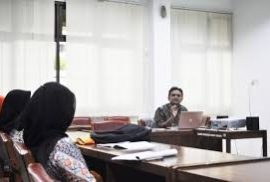Center for Southeast Asian Social Studies (CESASS) UGM successfully held the SEA Chat program in CESASS Library (28/08). Interestingly, this event was especially attended by students and teachers of SMP Tumbuh, Yogyakarta. SMP Tumbuh is the first high school that is famous for carrying inclusivity in its learning process. The inclusive junior is intended to receive all kinds of diversity from religion, belief, ethnicity, economic background, to mental ability.
The event that lasted from 13:00 to 15:00 pm began with a speech from Dr.phil.Vissia Ita Yulianto as a representative of CESASS, then it was continued with a welcome from Sri, M.A. as representative of SMP Tumbuh. The event was connected with a brief introduction about CESASS from Aditya Indra Nugraha, S.Ant. and a discussion entitled ” Knowing Southeast Asia and its Dynamics” with Gharin Putra Yanotama, S.IP. as moderator.








